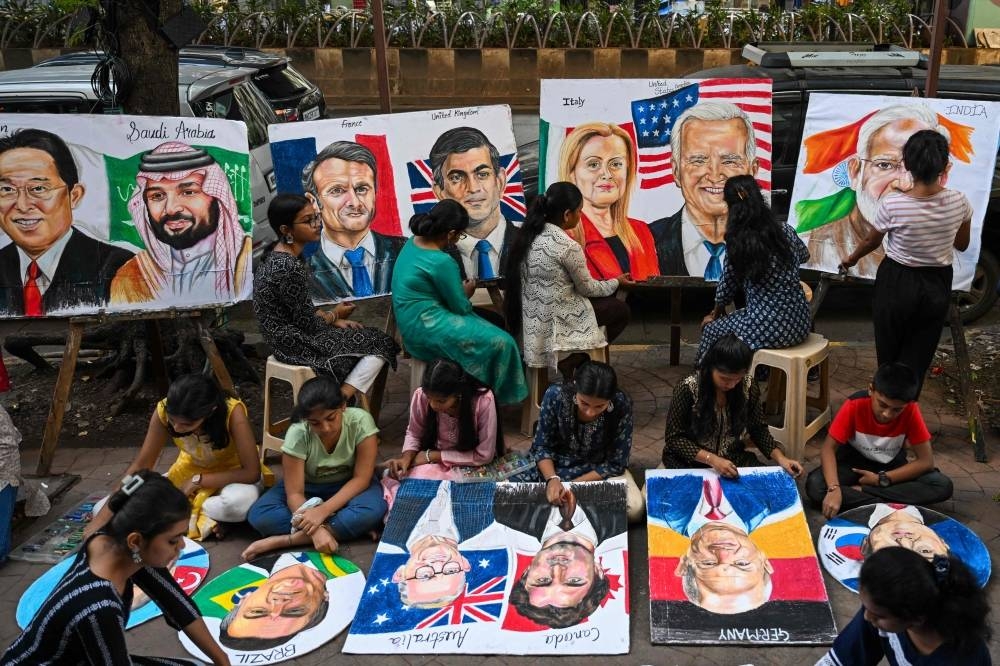Under the slogan "One Earth, One Family, One Future," the 18th annual summit of the leaders of G20 countries is set to commence tomorrow, Saturday in New Delhi.
Notably absent from the summit are Russian President Vladimir Putin and Chinese President Xi Jinping, which weakens hopes of reaching consensus on issues on the agenda. China will be represented at the summit by its Prime Minister, Li Qiang, while Russian President Putin will be represented by his Foreign Minister, Sergey Lavrov.
The G20 summit is being held amidst tight security measures, especially given that the list of participants includes some of the most prominent figures ever hosted by India, including US President Joe Biden, British Prime Minister Rishi Sunak, leaders and officials from Saudi Arabia, Japan, Australia, France, and Germany, in addition to the Secretary-General of the United Nations, the Managing Director of the International Monetary Fund, and the Presidents of the World Bank and the World Trade Organization, as well as the Director-General of the World Health Organization.
The summit will address a range of urgent global issues, amidst doubts about the unity of the bloc on contentious matters. These issues include the Russia-Ukraine war and climate change. The summit will also focus on sustainable development, food security, energy, reforming the global debt system, loans provided to developing countries by multilateral institutions, and other topics such as cryptocurrency regulation.
The G20 summit is being held in a year where India has become the world's most populous country, surpassing China, and the fifth-largest economy globally. The summit in New Delhi will serve as the culmination of all the G20 activities and meetings held throughout the year by ministers, senior officials, and civil society. Leaders are expected to adopt a statement at the end of the summit, outlining their commitment to the priorities discussed and agreed upon during ministerial meetings and working group discussions.
India, as the host country for the 2023 summit, aims to make its G20 presidency a bridge between major global economies and those of the Global South. It prioritizes the interests of the global South and, at the beginning of its G20 presidency, hosted the Global South Summit, attended by leaders and representatives from more than 125 developing countries.
President Joe Biden of the United States intends to use the summit to demonstrate that the G20 remains the primary forum for global economic cooperation, despite its divisions. The White House announced that Biden will hold separate talks with some leaders on addressing climate change and the war in Ukraine. He will also urge international organizations like the World Bank to do more to combat poverty.
President Joe Biden expressed his disappointment last week at not seeing his Chinese counterpart at the summit. This comes after a group of American foreign policy and trade officials visited Beijing in an attempt to repair deteriorating relations between the world's two largest economies. However, President Biden may still have a chance to hold a bilateral meeting with President Xi at the Asia-Pacific Economic Cooperation (APEC) forum in San Francisco in November.
The bilateral relationship between the United States and China faces a long list of problems, ranging from trade disputes to the future of Taiwan to China's expanded presence in the South China Sea.
Prior to this year's summit, the G20 appears to be deeply divided, particularly over the Russia-Ukraine conflict. Western countries allied with Kyiv view condemning Moscow as essential for issuing a joint statement at the end of the summit. Meanwhile, Russian Foreign Minister Sergey Lavrov has stated that Russia will prevent the issuance of a final statement at the summit unless the statement aligns with Moscow's positions on Ukraine and other crises.
However, India, as the summit's host, maintains a neutral position, with Indian Foreign Minister S. Jaishankar stating that the Ukrainian conflict, as a geopolitical issue, falls outside the scope of the G20, and it should be addressed by the United Nations Security Council.
Observers believe that this disagreement complicates the situation and increases uncertainty regarding the possibility of a joint communique being issued at this summit. Following a meeting of G20 finance ministers and central bank governors in February of this year, no joint statement was issued, making this outcome more likely for the upcoming summit.
Reports suggest that the G20 has agreed to grant permanent membership to the African Union, and this decision will be officially announced during the group's summit. This move will elevate the African Union, comprising 55 member states, from an invited international organization to a permanent member of the G20.
The G20 was established in 1999 to address disruptions in international financial markets during the Asian financial crisis. It consists of most of the world's major economies, including industrialized nations, and plays a pivotal role in the global economy and international trade. The G20 meets annually in one of its member countries to discuss global economic plans.
In recent years, the scope of issues discussed by G20 leaders has expanded beyond the economy to encompass matters such as climate change, sustainable energy, debt relief, and corporate taxation for multinational corporations. The member states of the group represent over 85% of the global GDP, three-quarters of global trade, and approximately two-thirds of the world's population, covering nearly 60% of the Earth's landmass.

